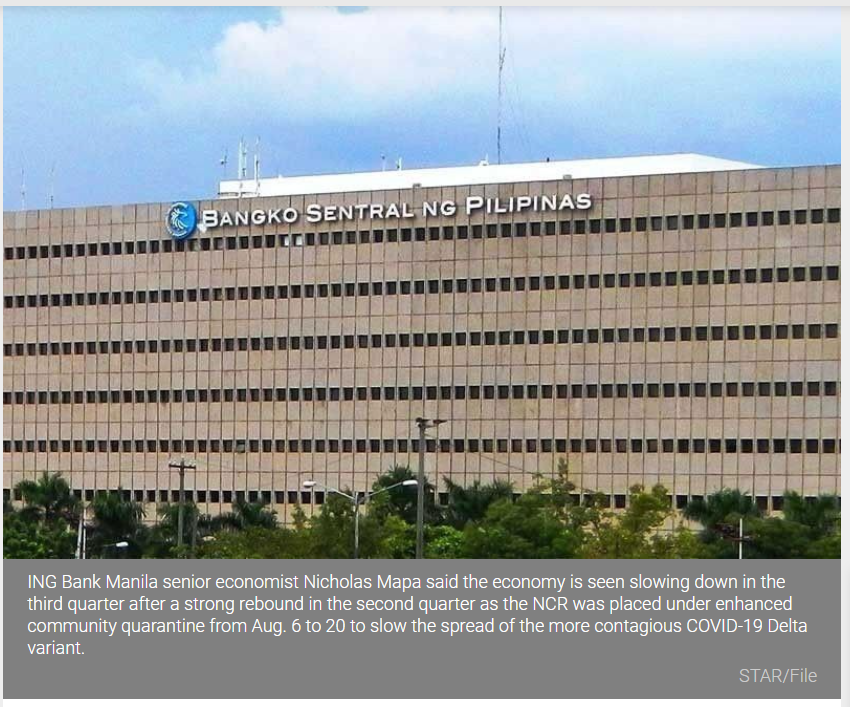Philippines: Speed bump may prompt BSP to keep rates low
MANILA, Philippines — The projected speed bump in the economic recovery in the third quarter arising from the reimposition of a strict lockdown in the National Capital Region (NCR) is likely to prompt the Bangko Sentral ng Pilipinas (BSP) to keep interest rates at record lows.
ING Bank Manila senior economist Nicholas Mapa said the economy is seen slowing down in the third quarter after a strong rebound in the second quarter as the NCR was placed under enhanced community quarantine from Aug. 6 to 20 to slow the spread of the more contagious COVID-19 Delta variant.
“The Philippine economy will likely hit a speed bump in the third quarter, with overall economic activity to slow further due to the imminent lockdown on Aug. 6. With the economy reeling from the pandemic, we doubt BSP will even consider pre-emptive recalibration of policy rates as policy tightening at this stage will definitely snuff out whatever momentum is left in the economy’s growth engines,” Mapa said.
The Philippines slipped into recession with a record 9.6 percent gross domestic product (GDP) contraction last year, ending 21 years of positive growth, as the the government imposed the longest and strictest lockdown in the world.
The BSP has committed to maintain an accommodative monetary policy stance until the economy has fully recovered from the impact of the global health crisis.
Among the central bank’s COVID-19 response measures include the cumulative 200 basis points cuts last year that brought the benchmark interest rate to a record low of two percent.
The Philippine Statistics Authority (PSA) reported inflation eased for the second straight month to four percent in July from 4.1 percent in June and averaged 4.4 percent in the first seven months of the year, still above the two to four percent target set by the BSP.
“Despite possible bouts of faster inflation, we fully expect BSP to keep policy rates unchanged for the rest of 2021 and well into 2022,” Mapa said.
The Dutch financial giant expects inflation pressures in the second half of the year given the heft of the food subsector in the overall consumer price index (CPI) basket despite extremely soft domestic demand with the ongoing recession.
It warned reports of a possible three to five percent increase in the cost of basic food items such as canned goods and packaged noodles on top of a possible pickup in fruits and vegetables due to storm damage would likely translate to elevated food inflation.
For his part, BSP Governor Benjamin Diokno said the central bank’s Monetary Board would consider the latest price developments along with the second quarter GDP outturn in its assessment of the monetary policy stance on Aug. 12.
“The BSP remains watchful over the evolving economic conditions and challenges brought about by the pandemic to ensure that the monetary policy stance remains consistent with its price and financial stability objectives,” Diokno said.
According to the BSP chief, the balance of risks to the inflation outlook remains broadly balanced over the policy horizon as the uptick in international commodity prices due to supply-chain bottlenecks and the recovery in global demand could lend upside pressures on inflation.
On the other hand, Diokno said the emergence of new COVID-19 variants and delays in easing lockdown measures are seen to pose downside risks to both demand and inflation.
Source: https://www.philstar.com/business/2021/08/06/2117867/speed-bump-may-prompt-bsp-keep-rates-low


 English
English




